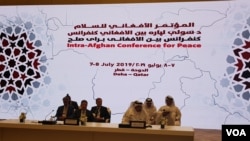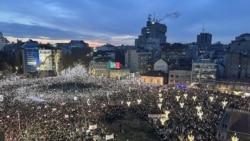Sebuah delegasi beranggotakan 50 tokoh elit Afghanistan berada di Qatar untuk perundingan perdamaian dengan para pemimpin Taliban, dengan harapan untuk mengakhiri konflik 18 tahun di Afghanistan.
KTT dua hari itu, yang difasilitasi Jerman dan Qatar, adalah "peluang bersejarah bagi mereka semua untuk menjembatani minimnya kepercayaan, yang akan membantu membuka jalan bagi perundingan perdamaian langsung antara pemerintah Afghanistan dan Taliban," kata Asadullah Zaeri, juru bicara Dewan Perdamaian Tinggi negara itu.
Delegasi tersebut meliputi para politisi, para petinggi dewan itu, wakil-wakil kelompok-kelompok perempuan dan sejumlah wartawan senior, katanya.
Meskipun kedua pihak telah menekankan bahwa para anggota pemerintah Afghanistan hadir atas nama pribadi, tidak mewakili pemerintahan Presiden Afghanistan Ashraf Ghani, kehadiran mereka membuat konferensi ini berbeda dari konferensi intra-Afghanistan di Moskow pada April. Ketika itu, Taliban menolak untuk duduk semeja dengan orang-orang dari pemerintahan Presiden Ghani—pemerintahan yang kata mereka merupakan "boneka" AS.
Para penyelenggara konferensi berharap langkah pertama ini akan membuka jalan bagi kemajuan yang lebih besar di masa depan. [vm/ft]
However, the United States seems to have succeeded in its efforts to get the Taliban to show flexibility.
“The Intra-Afghan Conference for Peace in #Doha has been a long time coming. It’s great to see senior government, civil society, women, and Taliban representatives at one table together,” tweeted U.S. Secretary of State Mike Pompeo.
The conference organizers are hoping this first step would pave way for a bigger breakthrough in future.
“A partial success is for people to continue to talk. A great success would be for them to come up with a framework that could lead into direct negotiations, Afghan-Afghan, and hopefully catch up with the speed in which the talks between the Taliban and the United States are progressing,” said Sultan Barakat, the director of the Center for Conflict and Humanitarian Studies at Doha Institute, who has been closely involved in organizing the event.
The Afghan meeting comes as the U.S. special envoy Zalmay Khalilzad, who’s already holding talks with the Taliban, is nearing an agreement over a timeframe for the U.S. and NATO troop withdrawal from the country.
Both sides claim the talks are progressing well.
“The last 6 days of talks have been the most productive session to date,” tweeted Khalilzad on Saturday. The two sides will resume on the 9th after this intra-Afghan interaction which Khalilzad called “a critical milestone.”
A Taliban spokesman said in a future conference, the insurgent group may be willing to talk to top level Ghani administration officials.
“If someone is coming in his or her personal capacity and expressing his or her views on how to bring about peace in Afghanistan, we have not put any restriction on that,” said Suhail Shaheen when asked whether the Taliban could sit with government ministers or top-level officials.
Afghan High Peace Council member Jamaluddin Badar said government representatives may be in Doha in their personal capacity but they “seemed to be giving the government’s point of view.”
He felt positive about the discussions held till late Sunday afternoon. The Taliban, he said, seemed to be willing to address some critical concerns of most Afghans, such as how to protect the gains made since the ouster of the insurgent group in 2001, particularly in terms of institution building and human rights.
“We might have disagreements with the Taliban on how to interpret those rights, but I don’t think they will be strong enough to lead to fighting,” he said. The Taliban, he added, have even been talking about the need to reduce violence against women.
He was not the only one who expressed optimism about the discussions with the Taliban.
“I think their attitude has changed tremendously. Last night they sat with women and we chatted. They tried to show that they are willing to talk to women,” said Asila Wardak, a women’s rights activist attending the conference.











